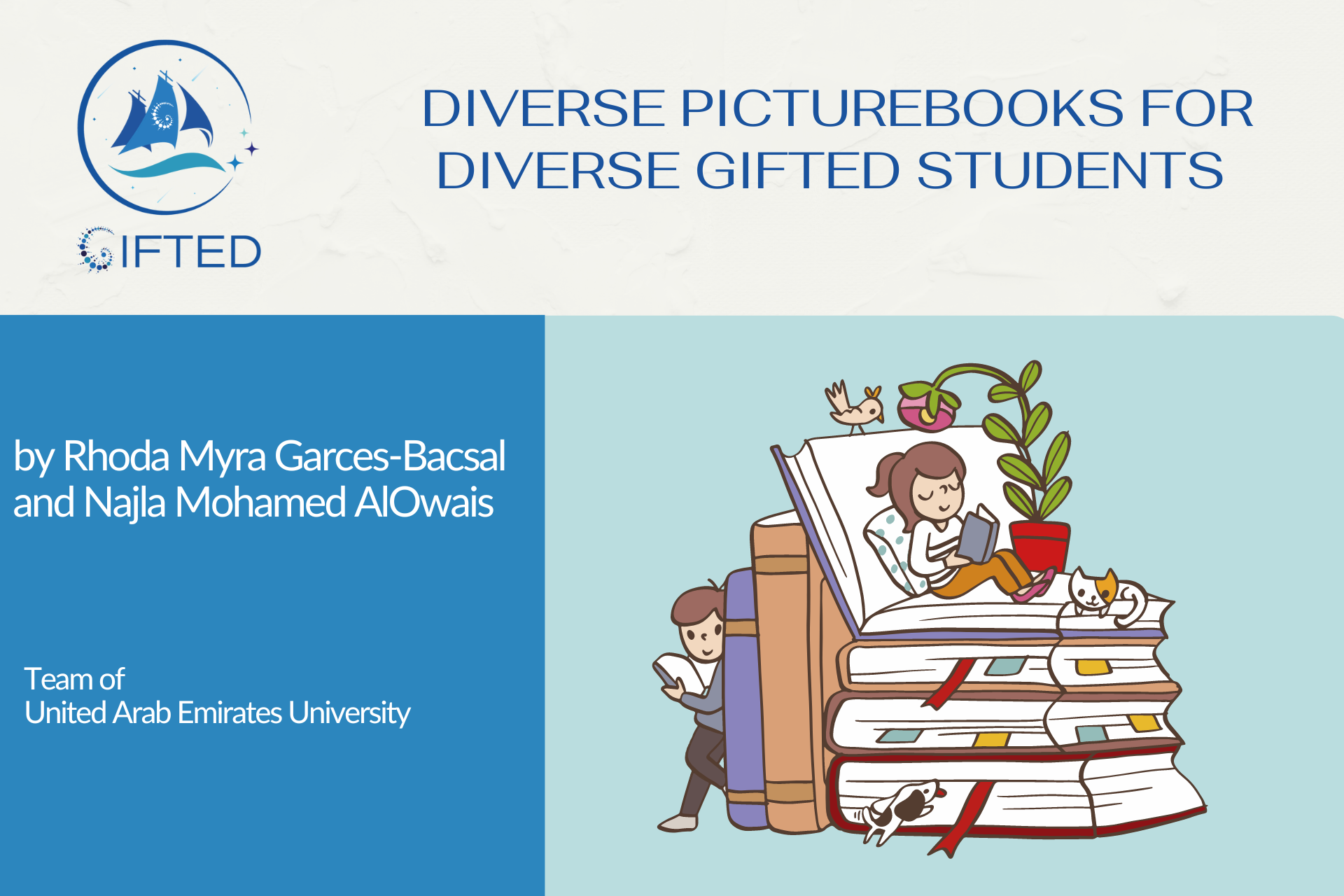Latest news

Diverse Picturebooks for Diverse Gifted Students
Dr. Myra Garces Bacsal is a clinical psychologist by training specializing in the social and emotional functioning of gifted and talented students. In recent years you have worked as a lecturer for teachers: for 11 years in Singapore and for four years in the United Arab Emirates. She has worked as a Program Leader for the Master of Education in High Ability Studies in Singapore, and as a Professional Development Leader and Pedagogical Development and Innovations Leader in her former academic group, Early Childhood and Special Needs Education at the National Institute of Education in Singapore.
Currently, she works as Assistant Dean of Research and Graduate Studies in the College of Education at the University of the UAE, and is developing an International Masters in Gifted and Talented Education.
Her area of interest has to do with building a diverse library for exceptional and diverse students, with an intent to facilitate social and emotional learning and inclusive practices. Her recent publications examine the value of using diverse biographies presented in picture books with different students (including gifted and talented students), and teachers’ pedagogical practices in relation to the use of diverse literature in the classroom.
The goal is to build the capacity of educators, professionals and parents to select and use authentic, multilayered and complex narratives to challenge gifted readers, and critically introduce concepts such as social justice, equity and global awareness into the classroom.
Diverse Picturebooks for Diverse Gifted Students
Rhoda Myra Garces-Bacsal and Najla Mohamed AlOwais
We live in an incredibly diverse world. This is mirrored in today’s classrooms filled with biracial, multi-ethnic, transnational, culturally and linguistically diverse, neuroatypical, gifted / high ability, students with hybrid and multi-hued identities from all parts of the globe. Educators need to go beyond a cursory awareness of this multiculturalism, but to be more attuned to subtle permutations of self-identification of these clear-eyed, critical, and inquisitive students who are navigating their own place in the world, as they find meaning in what they do inside and outside of school. This requires a deeper connection and engagement with the heterogenous gifted learners we, as educators, are privileged to interact with – and what better way to learn more about one another than through narratives; diverse stories that bring to light our shared vulnerabilities as human beings.
Empirical research has already long established how effective diverse picturebooks are in making diverse gifted students feel less invisible in the classroom (Garces-Bacsal et al., 2022a) as they identify with outstanding individuals from around the world and learn that they are not alone in their journey. Reading about a gifted individual’s life challenges: confronting racism, overcoming adversity and societal/cultural expectations, and working through one’s internal struggles and imperfections – can be validating, soul-affirming, and life-changing to gifted students (Garces-Bacsal et al., 2022b) who typically have heightened multifaceted sensitivities, rendering them more emotionally vulnerable and prone to philosophical ideations (Mendaglio, 2021). Yet, despite the significant amount of research pointing to the significance of using diverse narratives among our increasingly diverse students in the classroom, teachers remain largely unaware of, and lack the capacity to select and find exceptional diverse picturebooks as part of culturally relevant (Ladson-Billings, 2021), responsive (Gay, 2018) and sustaining (Alim & Paris, 2017) pedagogies to authentically address the needs of the culturally and linguistically diverse gifted in our classroom (Garces-Bacsal & Elhoweris, 2022).
In our recent research work, we have published a list of diverse picturebook titles from around the world to increase the repertoire of reading materials that committed teachers can use in the classroom (Garces-Bacsal et al., 2022a; Garces-Bacsal et al., 2022b, Garces-Bacsal, 2021; Garces-Bacsal & Tupas, 2021; Garces-Bacsal, 2020). As educators, we need to “read both the word and the world in relation to power, identity, difference” (Janks, 2013, p. 227; emphasis in original) along with our gifted students so that we can effectively guide them to be all they are meant to become.
References
Alim, H. S. & Paris, D. (2017). What is culturally sustaining pedagogy and why does it matter? In D. Paris & H. S. Alim (Eds.) Culturally sustaining pedagogies: Teaching and learning for justice in a changing world (pp. 1-24). Teachers College Press.
Garces-Bacsal, R. M. & Elhoweris, H. (2022). Decentering whiteness in gifted education: Addressing the needs of the gifted ‘others’ through social justice and culturally responsive pedagogies. Gifted Child Quarterly, 66(2), 121-123. https://journals.sagepub.com/doi/10.1177/00169862211037713
Garces-Bacsal, R. M., Alhosani, N. M., Elhoweris, H., Ghufli, H. T., AlOwais, N. J., Baja, E. S., & Tupas, R. (2022a). Using diverse picturebooks for inclusive practices and transformative pedagogies. In M. Efstratopoulou’s (Ed.) Rethinking inclusion and transformation in special education (pp. 72-92). IGI Global.
Garces-Bacsal, R. M., Alhosani, N. M., Elhoweris, H., Tupas, R. (2022b, in press). A diverse social and emotional learning booklist for gifted learners and advanced readers. Roeper Review.
Garces-Bacsal, R. M., & Tupas, R. (2021). Diverse picturebooks for diverse children: The Others in Singapore teachers’ discourse and pedagogy. Literacy Research and Instruction, 60(4), 372-390. https://doi.org/10.1080/19388071.2021.1878313
Garces-Bacsal, R. M. (2021). Of grit and gumption, sass and verve: What gifted students can learn from multicultural picture book biographies. In S. R. Smith’s (Ed.) Handbook of giftedness and talent development in Australasian Pacific (pp. 431-453). Springer International Handbooks of Education.
Garces-Bacsal, R. M. (2020). Diverse books for diverse children: Building an early childhood diverse booklist for social and emotional learning. Journal of Early Childhood Literacy, 22(1), 66-95. https://doi.org/10.1177/1468798420901856
Gay, G. (2018). Culturally responsive teaching: Theory, research, and practice. Teachers College Press.
Janks, H. (2013). Critical literacy in teaching and research. Education Inquiry, 4(2), 225-242. https://doi.org/10.3402/edui.v4i2.22071
Ladson-Billings, G. (2021). Culturally relevant pedagogy: Asking a different question. Teachers College Press.
Mendaglio, S. S. (2021). Overexcitability and giftedness research: Whose constructs are being investigated and how? In S. R. Smith’s (Ed.) Handbook of giftedness and talent development in Australasian Pacific (pp. 359-376). Springer International Handbooks of Education.
